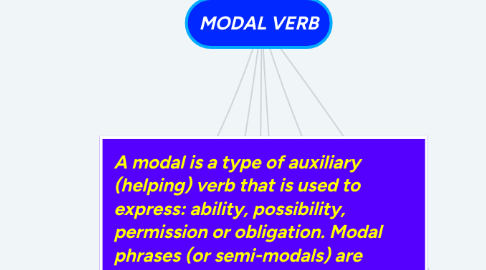
1. Can/could/be able to
1.1. Can, could and be able to are used to express a variety of ideas in English:
1.1.1. can/can’t + base form of the verb
1.1.1.1. 1. Tom can write poetry very well. 2. I can help you with that next week. 3. Lisa can’t speak French.
1.1.2. am / is / are / will be + able to + base form of the verb am not/ isn’t / aren’t/ won’t be + able to + base form of the verb
1.1.2.1. 1. Mike is able to solve complicated math equations 2. The support team will be able to help you in about ten minutes. 3. I won’t be able to visit you next summer.
2. May/might
2.1. Formal Permission / Formal Prohibition
2.1.1. Formal Permission / Formal Prohibition
2.1.1.1. may / may not + base form of the verb
2.1.1.1.1. 1. You may start your exam now. 2. You may not wear sandals to work
2.1.2. Polite Request
2.1.2.1. May + subject + base form of the verb
2.1.2.1.1. 1. May I help you?
2.1.3. Possibility / Negative Possibility
2.1.3.1. may/ might + base form of the verb
2.1.3.1.1. 1, We may go out dinner tonight. Do you want to join us? 2. Our company might get the order if the client agrees to the price.
2.1.4. Possibility / Negative Possibility
2.1.4.1. may/ might + base form of the verb
2.1.4.1.1. 1. We may go out dinner tonight. Do you want to join us? 2. Our company might get the order if the client agrees to the price.
2.1.5. To Make a Suggestion (when there is no better alternative)
2.1.5.1. may as well / might as well + base form of the verb
2.1.5.1.1. 1- You may as well come inside. John will be home soon. 2- We might as well take Friday off. There’s no work to be done anyway.
3. A modal is a type of auxiliary (helping) verb that is used to express: ability, possibility, permission or obligation. Modal phrases (or semi-modals) are used to express the same things as modals, but they are a combination of auxiliary verbs and the preposition to. The modals and semi-modals in English are;
4. Will/would
4.1. will / won’t + base form of the verb
4.1.1. 1- John will pick you up at 7:00am. 2- Beth won’t be happy with the results of the exam.
4.2. Polite Request or Statement
4.2.1. 1- Will you please take the trash out? 2- Would you mind if I sat here? 3- I’d (I would) like to sign up for your workshop.
4.3. Habitual Past Action
4.3.1. 1- When I was a child, I would spend hours playing with my train set. 2- Peter wouldn’t eat broccoli when he was a kid. He loves it now.
5. Shall/should
5.1. To Offer of Assistance or Polite Suggestion (When you are quite sure of a positive answer)
5.1.1. Shall + subject + base form of the verb
5.1.1.1. 1- Shall we go for a walk?
5.2. To Offer of Assistance or Polite Suggestion (When you are not sure of a positive answer)
5.2.1. Should + subject + base form of the verb
5.2.1.1. 1- Should I call a doctor?
5.3. A Prediction or Expectation that Something Will Happen
5.3.1. should/shouldn’t + base form of the verb
5.3.1.1. 1- The proposal should be finished on time. 2- I shouldn’t be late. The train usually arrives on time.
5.4. To Give Advice
5.4.1. should / ought to + base form of the verb
5.4.1.1. 1- You should check that document before you send it out. 2- You ought to have your car serviced before the winter.
5.5. To Give Advice (about something you think wrong or unacceptable)
5.5.1. shouldn’t + base form of the verb
5.5.1.1. 1- James shouldn’t teach him words like those.
6. Must/have to
6.1. Present and Future:
6.2. Past:
6.2.1. had to / needed to + base form of the verb
6.2.1.1. must / have to / need to + base form of the verb
6.2.1.1.1. 1- You must have a passport to cross the border. 2- Elisabeth has to apply for her visa by March 10th. 3- I need to drop by his room to pick up a book.
6.3. Almost 100% Certain
6.3.1. must + base form of the verb
6.3.1.1. had to / needed to + base form of the verb
6.3.1.1.1. 1- Thomas has lived in Paris for years. His French must be very good.
6.4. To Persuade
6.4.1. must / have to + base form of the verb
6.4.1.1. 1- You must try this wine. It’s excellent. 2- You have to visit us while you’re in town.
6.5. Prohibited or Forbidden
6.5.1. must not / mustn’t + base form of the verb
6.5.1.1. 1- You must not drive over the speed limit. 2- You mustn’t leave medicines where children can get to them.
6.6. Lack of Necessity
6.6.1. don’t /doesn’t /didn’t + have to + base form of the verb
6.6.1.1. 1- You don’t have to park the car. The hotel valet will do it for you. 2- Tim doesn’t have to go to school today. It’s a holiday. 3-You didn’t have to shout. Everyone could hear you.
6.6.2. needn’t + base form of the verb
6.6.2.1. 1- You needn’t worry about me. I’ll be fine
